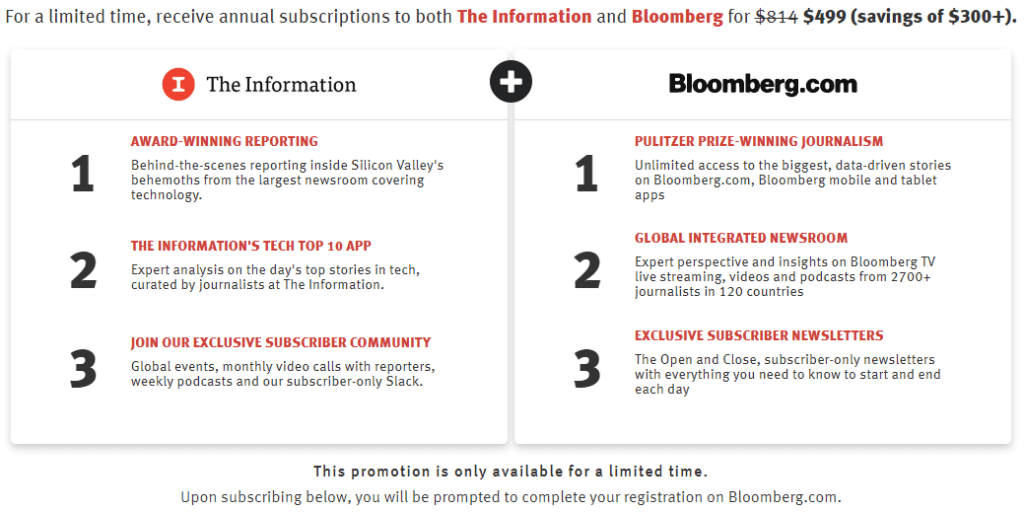|
Getting your Trinity Audio player ready...
|
Powerhouse business and tech publishers The Information and Bloomberg Media have come together to offer a joint subscription to both titles in a trial which could see a longer term partnership established between the two publishers.
At present, annual subscriptions cost up to $749 at The Information, and $475 at for an All Access pass to Bloomberg. The combined package offered by the publishers is $499 for the year, which includes access to exclusive subscriber newsletters, video calls, apps, podcasts, and the paywalled reporting across both sites.

Talks about a potential partnership between the two companies were being held in September last year. The audience alignment makes a great deal of sense as both businesses cater to a high-end business reader, said Axios. Sara Fischer commented at the time that “the subscription landscape is growing so competitive, that news companies banning together to sell joint subscription packages may be the next big trend.”
According to Digiday, revenues from the partnership will be split 50-50 between the two publishers, even if one brings in more subscribers than the other.
A bundle by any other name
There are still hurdles to be overcome with the partnership, with backend systems just being part of the challenge. Users coming to the promotion through The Information are currently being asked to complete their purchase on Bloomberg’s site.

At present, the ‘bundle’ expires after a year, with Bloomberg’s subscription page stating that the promotional pricing is only valid for one year, with the Bloomberg.com subscription being billed at $415 yearly after the first year is up.
The Information’s founder Jessica Lessin confirmed on Twitter that at present, everything is being kept simple “for testing purposes, to move fast and learn.” She told Stratechery’s Ben Thompson that they were “figuring out” what a renewal would look like, but wanted to see how the partnership worked out.
Technicalities about the term ‘bundle’ aside, Lessin said in a post announcing the partnership that she has “long been interested in the idea of what the future news/media bundle looks like, inspired by the cable industry.”
“I have never been more convinced now is the time to act,” she wrote. “Six years ago, as I was launching The Information, I knew the most important trend in news would be new and legacy publications driving direct subscriptions for their audience.”
Lessin argues that the success of that approach offers publishers the chance to broaden their reach by allying, in a way that reduces reliance on Google and Facebook. “Our partnership represents publishers working together – without tech platforms – to reach readers with quality and independent journalism,” she stated pointedly.
“As companies like Facebook and Google offer hundreds of millions of dollars to news publishers, many publishers are giddy. I’m leery…it’s more improtant that the news industry is independent and in charge of its own destiny.”
Lessin believes that the news industry works at its best when “the maximum number of outlets are doing the best possible work.” “Another reason I am so bullish about the bundle is the competitive dynamics of news. News has never been winner-takes-all,” she concludes in her post, as she hints towards partnering with others in the industry in the “months ahead.”
Bundles to combat subscription fatigue
As more publishers put up paywalls, ‘subscription fatigue’ has been a fear often voiced among industry professionals. This is compounded by findings from the Reuters Institute’s Digital News Report for 2019, which found that even among people who like paying for news, they will usually only pay for one subscription.
The play from Bloomberg and The Information therefore is that it’s better to split the $499 between them than to compete alongside many other publishers for the same people who will choose only one tech and business publication to subscribe to. It’s a model TV and cable companies have followed for many years.
Bundles are not a new offering from publishers, but often they are done in partnership with companies offering different services, like the New York Times and Scribd. This bundle offered access to The Times’s journalism, as well as Scribd’s own collection of over a million books, audiobooks, newspapers and magazines.
John McCarthy, Online Senior Reporter at The Drum, says that we could see more of these symbiotic relationships going forward. “Two similar-minded publishers looking to cross audiences and sell unified packages makes sense,” he told WNIP. “It’s a proactive move away from the more parasitic partnerships with tech platforms.”
“Together, Bloomberg and The Information customers get a better deal, with a broader selection of quality journalism. The publishers also get a wider funnel to attract more paying readers.”
However Bloomberg and The Information decide to progress the offer after a year, we certainly haven’t heard the last of the bundle. As tech companies like Apple mull entertainment bundles of their own, publishers may find similar partnerships for overlapping coverage a key component in convincing readers to funnel money their way.



